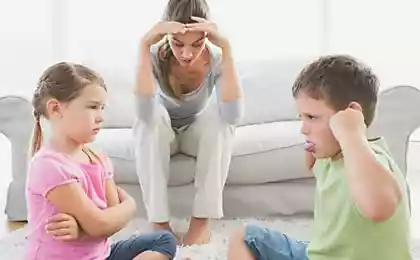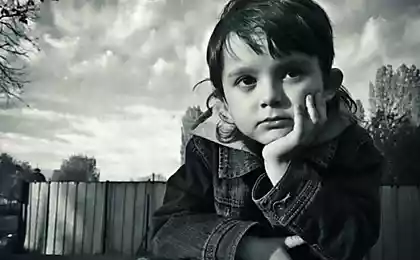556
How to raise children without strain
Children's behavior, especially when it is imperfect — the main cause of our appeals to all sorts of benefits for education. If you have tried everything or time for the innumerable tips you do not, then the author of the bestseller "Discipline without injuries: How to raise children without anguish" psychologist Vanessa Lapointe and synthesized the most effective methods in several points.

Vanessa Lapointe children Have needsLapointe in the book pays great attention to ensuring that children are not little adults who can fully control their actions and emotions. Children have their specific needs. So the author advises not only to focus on the child's behavior, how much on your own. You respond to the emotional needs of the child? You have imagination, patience, compassion, to establish among you a relationship of trust and to be those adults who need child?
What to do:
Children 2-3 years: Impulsivity the child is not controlled, tantrums and screaming is totally normal, is the opening of independence: you hear "no" very often."
Children 3-4 years: They have better control of frustration and anger, but they still need adult's help to cope with them.Now they are probing your boundaries, often Express their desires and preferences. They can be aggressive, but the development of speech must balance this.
Children 5-7 years: Children become more independent, they see themselves not as a "derivative" of the parents. It is better cope with their crises, but the tantrums still happen.In my head they can peacefully coexist two or more completely contradictory thoughts. It helps them solve problems: "I want this ball, but I'll have to take it away from Bob, and he complains, so I'm not going to do that, because I chew".
Children 8-10 years: they Have their own sense of style, your interests and Hobbies. They cross the border, so they need supervision and guidance. They are able to control yourself, but sometimes can be broken.
Children 11-12 years: they Have their own strong beliefs, boundaries cause a desire to destroy them. They love to "discuss" the rules.Often their rebellion seems intentional, but it's the fact that they only learn to Express themselves.
Children 13-17 years old: They, like the children of the previous age category, but mood swings have them a lot stronger. They consider themselves adults, and even they seem, but they are still children and still need parents.
What to do?
Bring your expectations in line with the stage of development of your child. It's not "wrong" methods — just their time has not come.
More specifically
If all this is too vague for you, you can take the advice of the psychologist Laura Markham, which is also "for" education without injury.

Laura Markham1. Always stay in emotional contact with childrendo Not concentrate on the child's behavior, focus on what he feels. Key phrase: "Come to me, I'll help you."
2. Just calmthe more annoyed the child, the more relaxed must be an adult, but not cold, and confident.
3. Do not read notation in a moment of crisis,Your goal is to calm the child, will speak at a more appropriate time. Stick to what really need to know and make a baby in this moment: "Stop doing it", "Use kind words", etc.
4. Keep the firmness with kindnessHere suitable method of "no/I know." For example: "No, the cat can not be cut, I understand that you're disappointed."
5. Don't go into explanationsAt least when the child is hysteria.Hold boundaries, will explain when the child will calm down.
6. Gain exposureWhen the child has calmed down and accepted the boundaries that you set and hold in terms of your peace of mind, even if the episode was a week, remind them about what happened and how everything is peaceful in the end was resolved. Assure them that you will continue to protect them and love them. Please refrain from sentences "And rules are rules!". published
P. S. And remember, only by changing their consumption — together we change the world! ©
Source: womo.ua/po-strunke-kak-distsiplinirovat-detey-raznogo-vozrasta/

Vanessa Lapointe children Have needsLapointe in the book pays great attention to ensuring that children are not little adults who can fully control their actions and emotions. Children have their specific needs. So the author advises not only to focus on the child's behavior, how much on your own. You respond to the emotional needs of the child? You have imagination, patience, compassion, to establish among you a relationship of trust and to be those adults who need child?
What to do:
- You need to use emotional relationship with the child to understand the reason for problem behavior and work with it. Keep in mind that you should care not so much about "peace and order", but about how to provide space for the free expression of emotions.
- Take care of yourself: find ways to relax and stay calm in the midst of chaos, which is an element of childhood.
- Don't think about the standards, accepted in society, think about what you need for your child: you, your sympathy, your presence, your understanding, to feel and to protect him.
Children 2-3 years: Impulsivity the child is not controlled, tantrums and screaming is totally normal, is the opening of independence: you hear "no" very often."
Children 3-4 years: They have better control of frustration and anger, but they still need adult's help to cope with them.Now they are probing your boundaries, often Express their desires and preferences. They can be aggressive, but the development of speech must balance this.
Children 5-7 years: Children become more independent, they see themselves not as a "derivative" of the parents. It is better cope with their crises, but the tantrums still happen.In my head they can peacefully coexist two or more completely contradictory thoughts. It helps them solve problems: "I want this ball, but I'll have to take it away from Bob, and he complains, so I'm not going to do that, because I chew".
Children 8-10 years: they Have their own sense of style, your interests and Hobbies. They cross the border, so they need supervision and guidance. They are able to control yourself, but sometimes can be broken.
Children 11-12 years: they Have their own strong beliefs, boundaries cause a desire to destroy them. They love to "discuss" the rules.Often their rebellion seems intentional, but it's the fact that they only learn to Express themselves.
Children 13-17 years old: They, like the children of the previous age category, but mood swings have them a lot stronger. They consider themselves adults, and even they seem, but they are still children and still need parents.
What to do?
Bring your expectations in line with the stage of development of your child. It's not "wrong" methods — just their time has not come.
More specifically
If all this is too vague for you, you can take the advice of the psychologist Laura Markham, which is also "for" education without injury.

Laura Markham1. Always stay in emotional contact with childrendo Not concentrate on the child's behavior, focus on what he feels. Key phrase: "Come to me, I'll help you."
2. Just calmthe more annoyed the child, the more relaxed must be an adult, but not cold, and confident.
3. Do not read notation in a moment of crisis,Your goal is to calm the child, will speak at a more appropriate time. Stick to what really need to know and make a baby in this moment: "Stop doing it", "Use kind words", etc.
4. Keep the firmness with kindnessHere suitable method of "no/I know." For example: "No, the cat can not be cut, I understand that you're disappointed."
5. Don't go into explanationsAt least when the child is hysteria.Hold boundaries, will explain when the child will calm down.
6. Gain exposureWhen the child has calmed down and accepted the boundaries that you set and hold in terms of your peace of mind, even if the episode was a week, remind them about what happened and how everything is peaceful in the end was resolved. Assure them that you will continue to protect them and love them. Please refrain from sentences "And rules are rules!". published
P. S. And remember, only by changing their consumption — together we change the world! ©
Source: womo.ua/po-strunke-kak-distsiplinirovat-detey-raznogo-vozrasta/
IMPORTANT! WHAT you need to know about grains: phytic acid in popular products
Low calorie morning DETOX drink























